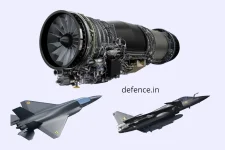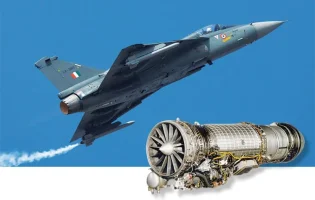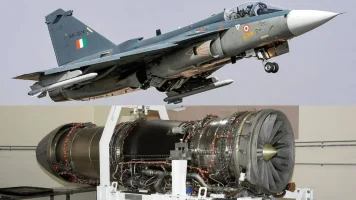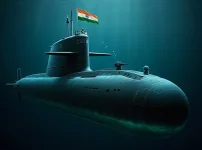- Views: 3K
- Replies: 13
India's long-held ambition to develop its own jet engines for fighter aircraft faces a critical juncture, prompting calls to involve the nation's burgeoning private defence industry in reviving the indigenous Kaveri engine project.
The move aims to address the immediate engine requirements for the Tejas Mk1A aircraft and reduce dependence on foreign suppliers like General Electric (GE).
The Kaveri engine program, initiated by the Defence Research and Development Organisation's (DRDO) Gas Turbine Research Establishment (GTRE) in 1986, was originally intended to power India's Light Combat Aircraft (LCA) Tejas.
However, despite decades of development and significant investment exceeding ₹2,839 crore, the Kaveri has not achieved the necessary performance standards for operational deployment. Key issues include falling short on required thrust, excessive weight, and performance limitations at high altitudes.
Consequently, current fighter programs rely on imported engines. The Tejas Mk1A jets use the GE F404-IN20 engine, while the upcoming Tejas Mk2 and the Advanced Medium Combat Aircraft (AMCA) Mk1 are planned to use the more powerful GE F414. This reliance represents a significant challenge to India's goal of 'Atmanirbhar Bharat' or self-reliance in critical defence technologies.
As India's private companies gain prominence in defence manufacturing, there is a growing debate about transferring the Kaveri engine's technology to capable private firms.
Proponents argue that this could be the key to resolving the engine's technical issues and developing advanced variants for future aircraft, potentially mirroring the success of global engine manufacturers like GE (USA) and Safran (France), which benefit from strong government-private sector collaboration.
Several Indian private firms, including Tata Advanced Systems, Larsen & Toubro (L&T), Godrej Aerospace, and Mahindra Aerostructures, have demonstrated significant capabilities in aerospace and defence manufacturing. They produce critical components for aircraft, missiles, and space launch vehicles.
Godrej Aerospace, for instance, has expertise in high-temperature alloys and complex machining vital for engine production, while companies like Tata and L&T have experience through partnerships with international Original Equipment Manufacturers (OEMs).
Transferring Kaveri technology to a consortium of private companies, with support from the DRDO and the Ministry of Defence (MoD), could offer several advantages.
Firstly, it could expedite efforts to upgrade the Kaveri to meet the 85-90 kN thrust needed for the 123 Tejas Mk1A jets currently ordered, mitigating risks associated with foreign supply chains and ensuring steady production at Hindustan Aeronautics Limited (HAL).
Secondly, private industry could lead the development of more powerful Kaveri derivatives required for future platforms like the Tejas Mk2, AMCA, and unmanned combat systems.
Furthermore, such a move could establish an Indian model of government-private synergy similar to those supporting GE and Safran internationally. A successful, privately produced Kaveri could also open export opportunities, positioning India as an engine supplier for nations operating comparable fighter aircraft.
However, this path requires substantial government backing. While the MoD's allocation of ₹26,000 crore in September 2024 for aero-engine development signals positive intent, a clear framework for private sector involvement is crucial.
This would likely involve defining technology transfer terms, establishing joint R&D facilities, offering financial incentives and long-term contracts, and potentially facilitating international collaborations, possibly deepening ties with Safran or Rolls-Royce.
Moreover, Significant challenges remain. Jet engine development involves mastering extremely complex technologies where India currently lags. Private firms, while capable in specific areas, lack the comprehensive end-to-end experience of established global players.
Overcoming the Kaveri's history of delays and managing potential coordination issues within a private consortium will also be critical. Balancing the roles of private industry and the established public sector undertaking HAL is another important consideration.
Ultimately, achieving self-sufficiency in aero-engine technology is seen as vital for India's strategic autonomy, shielding its defence programs from potential international sanctions, supply disruptions, and cost volatility, such as reported issues with F404 engine supplies in 2023.
Reviving the Kaveri through private sector participation is viewed not just as a solution for the Tejas, but as a foundational step towards powering India's future generations of combat aircraft and strengthening its position as a major aerospace power.




